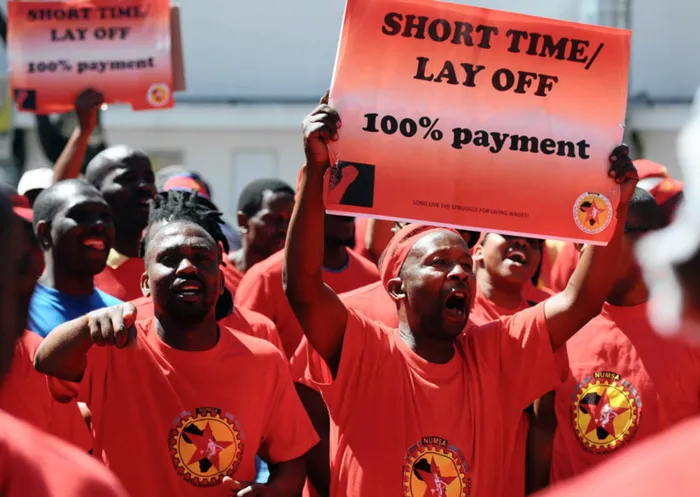Car workers take pay fight to the bosses

03/09/2013 Underpaid and cheaply-exploited National Union of Metalworkers of South Africa Automobile sector members during their march in Pretoria. Picture: Phill Magakoe 03/09/2013 Underpaid and cheaply-exploited National Union of Metalworkers of South Africa Automobile sector members during their march in Pretoria. Picture: Phill Magakoe
Pretoria - After working at one of the biggest vehicle manufactures for 25 years, Enoch Masina still cannot afford a car.
Masina, who works for Ford Motor Company in Silverton, was one of the hundreds of National Union of Metalworkers of South Africa members who marched to the National Automobile Manufacturers of South Africa offices in Pretoria on Tuesday, demanding higher wages.
Masina, who does the final inspection after a car has been assembled, earns R50 an hour. “I work 40 hours a week and I cannot even afford a car. I had to choose between buying a car and having a house. The house was a better option because my children can have a place to stay.”
The 53-year-old’s wife is unemployed, so the burden to care for his family falls on his shoulders. He is now worried about how he will survive the month as the strike has now been going on for 12 days. So far he has lost R4 800 in wages.
“I expect to hear from the bank calling me and telling me that they want to repossess the house,” said Masina.
The peaceful march started at the Old Putco bus depot and ended at the Naamsa offices on Steve Biko Street. There was a strong police contingent as about 11 000 marchers were expected. The industry has offered a 10 percent increase over three years, which the union has rejected. They demand a 13 percent increase over three years.
Numsa national treasurer Mphumzi Maqungo said the car industry treated workers like slaves. “Employers are arrogant. We shall emerge from this strike victorious. Employees produce export vehicles and this means they are highly skilled, so they must be appreciated. If they do not meet our demands, we know how to make the industry ungovernable.”
Other than the double-digit increase, employees also want better transport and medical aid incentives. “In 2010 we negotiated for a double-digit increase. After the agreement, Toyota went and added R3.22 on top of the 10 percent. We cannot allow such anomalies in the industry. We want all workers to be brought to the same rate as those at Toyota.
“We demand equal pay for equal work,” Maqungo said.
The strike has affected Nissan, BMW, Toyota, General Motors, Mercedes-Benz, Volkswagen and Ford, as well as some truck and bus makers.
Thapelo Molapo, chairman of the Automobile Manufacturers Employers Organisation, said the industry was losing about R600 million a day because of the strike. “It is not only about the money, but because we deal with exports, the country’s good name is being damaged. The countries we export to do not understand the strikes. The strike has to be resolved soon.”
Molapo said the manufacturers met the union last Thursday. “We are now at a stage where the union has to go back and explain to employees what we are offering. This is a three-year deal and it will not be responsible to reduce our offer to rand and cents. Our offer is substantial and as you can tell, the strike is not about wages but more about incentives.”
tebogo.monama@inl.co.za
Pretoria News